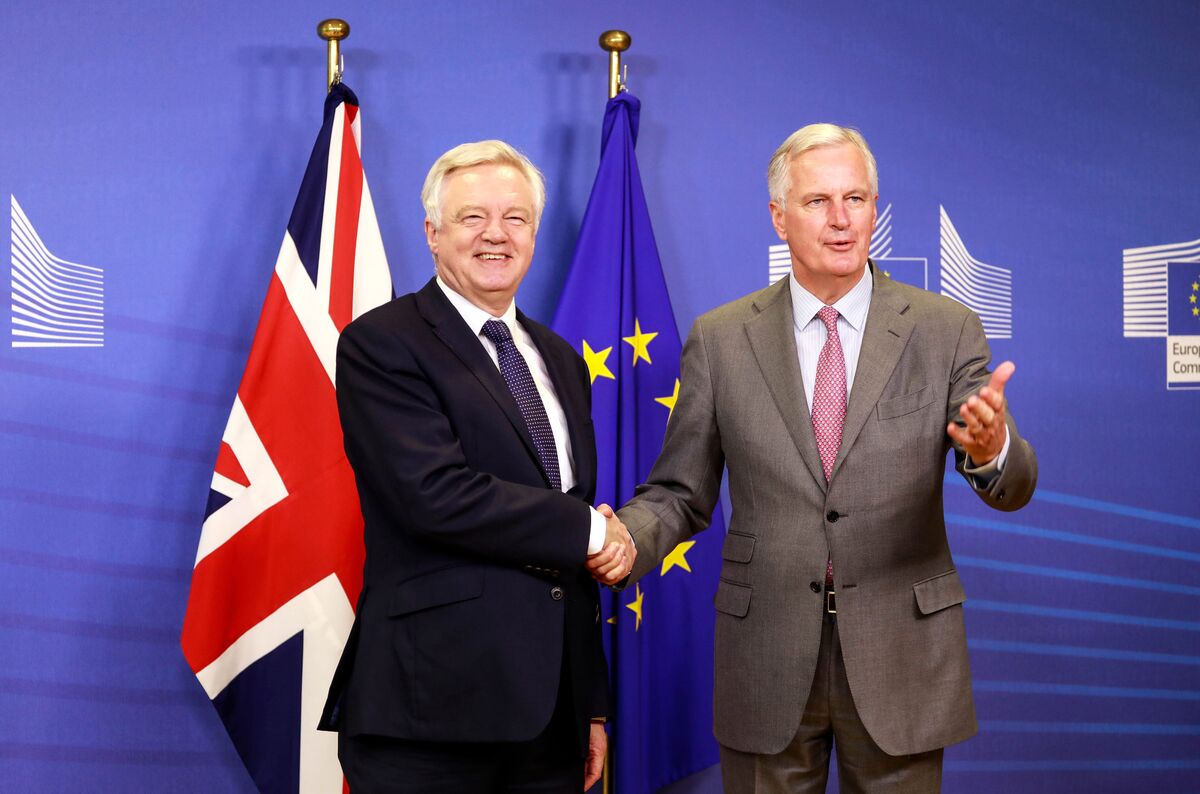
Brexit Secretary David Davis returned to Brussels Monday to resume Brexit talks with the European Union, as infighting among ministers in London over the future of Prime Minister Theresa May gathered pace.
Davis and the EU’s chief Brexit negotiator, Michel Barnier, shook hands before the start of four days of talks on the priority issues identified by the bloc, including the rights of EU citizens in the U. and Britain’s financial obligations. Davis left Brussels around three hours later, leaving lower-ranking officials to carry out technical work. He plans to go back to the Belgian capital on Thursday.
In a tacit acknowledgment that last month’s opening of negotiations had achieved little, Davis said it was now crucial to “get into the substance of the matter.”
“For us it’s incredibly important that we now make good progress,” Davis told reporters. It’s time to “negotiate through this and identify the differences so we can deal with them, and identify the similarities so we can reinforce them.”
Davis is in a rush to move talks toward the crucial issue of future trade even as open divisions in the cabinet back home make it hard for Europe to know what Britain wants. A Sunday Times photo montage illustrated May’s tenuous grip on power with an image of Chancellor of the Exchequer Philip Hammond, Davis and Foreign Secretary Boris Johnson -- all names touted as potential successors -- aiming pistols at each other.
May will remind her cabinet on Tuesday of the need to keep their meetings private, her spokesman, James Slack, told reporters in London on Monday.
The EU has made much of the early running by agreeing its positions on the issues up for debate as well as forcing the U. into its schedule of discussing “divorce” issues such as citizens’ rights and financial obligations before moving on to a future trade arrangement.
Read more about Davis wants on a Deal on Citizens Rights
Davis is also now echoing Barnier’s refrain that the time left to get a deal is slipping away and common ground must be found swiftly. He is planning to spend only a few hours in Brussels on Monday before returning for the conclusion of this negotiating round on Thursday.
May’s Brexit point person is among the members of her cabinet said to be unhappy about the prime minister’s policy toward the EU. He has warned May repeatedly that the uncertain fate of citizens after the U.’s withdrawal in 2019 was souring his meetings with member states, two people familiar with the matter told Bloomberg this month. Even so, she rejected his pleas to make an unconditional pledge on their rights.
Amid dismay at May since she lost the government’s parliamentary majority in last month’s general election, some 30 Conservative Party lawmakers would back a leadership bid by Davis, the Sunday Telegraph reported, citing unidentified allies of the Brexit secretary including two former cabinet ministers.
Pirates
The Telegraph reported an unidentified cabinet minister using expletive-filled language to accuse Hammond of treating colleagues who supported the Leave campaign, such as Davis, like “pirates who have taken him prisoner.”
Johnson is also in Brussels on Monday, discussing foreign policy with his 27 EU counterparts in a separate EU building. When he spoke to reporters about 30 minutes after Davis, he ignored questions about the conflict in the cabinet.
“In another part of town today I am very pleased that negotiations are beginning; as you know a very fair serious offer has been put on the table by the U. He added that Britain’s proposal to safeguard the rights of European citizens is “good” and “I hope very much that people will look at that offer in the spirit it deserves.”
That hasn’t happened yet and the EU wants the U. to go further on the 3.2 million EU citizens in Britain and another 1 million Britons living across the EU. Barnier appeared exasperated last week as he said the U.’s offer on citizens reduced their current level of rights, and said he was astounded that some members of the British government still didn’t accept that the country has to pay its dues. tried to allay those concerns on Thursday with a written statement to Parliament referring explicitly to a “financial settlement” for the first time.
May’s decision to activate the EU’s exit clause three months ago means that the U. will leave the bloc with or without a deal in March 2019. The EU has said it will only allow talks on a future relationship once there’s “sufficient progress” on citizens’ rights and the U.’s financial obligations.
“We need to examine and compare our respective positions in order to make progress,” Barnier told reporters before talks started on Monday.


0 comments:
Post a Comment